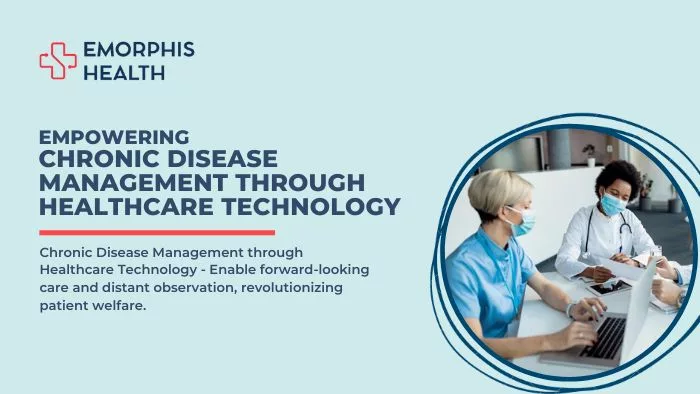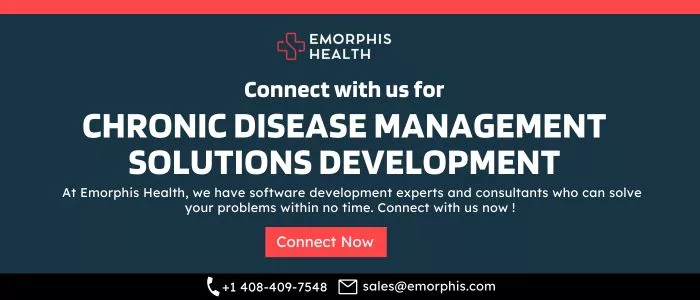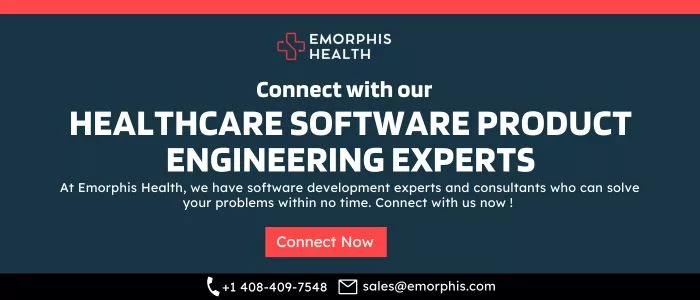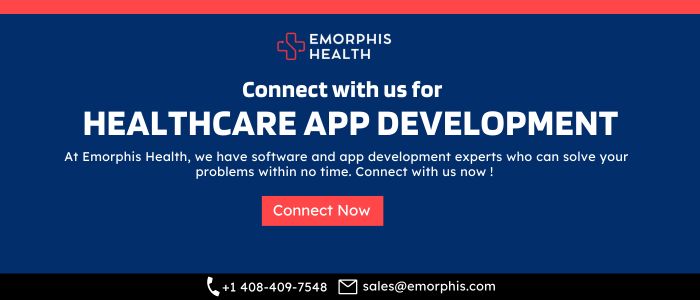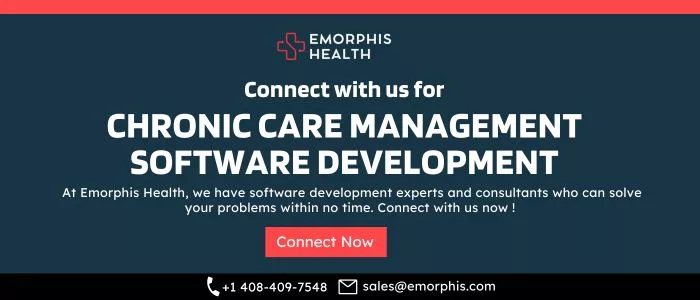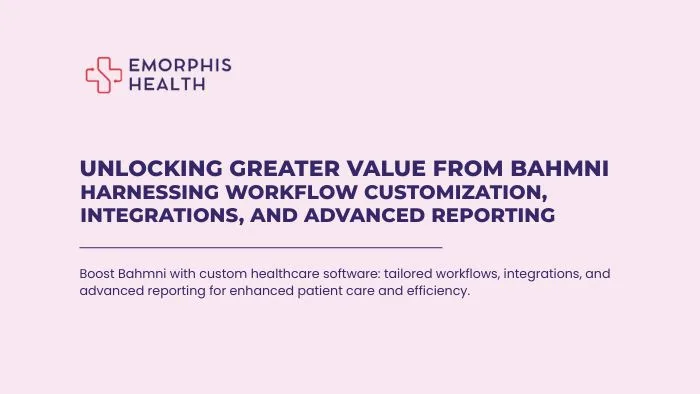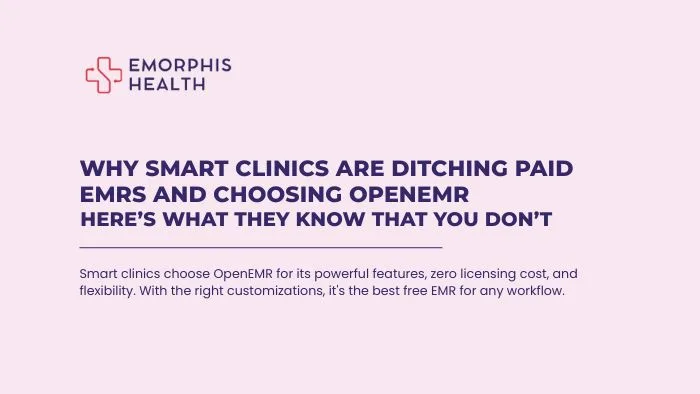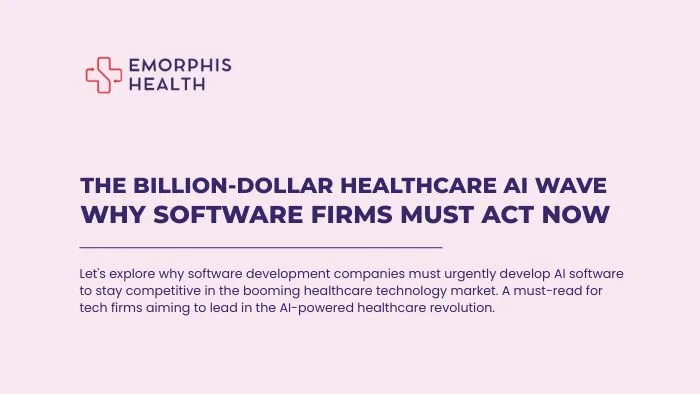Introduction to Chronic Disease Management
See Contents
- 1 Introduction to Chronic Disease Management
- 2 Role of Healthcare Technology in Revolutionizing Chronic Disease Management
- 3 What are the Popular Healthcare IT Solutions for Chronic Disease Management?
- 4 Conclusive Impact of Healthcare IT Services
- 5 Development of Healthcare Technology for Chronic Disease Management
- 6 Benefits of Healthcare Technology in Chronic Disease Management
- 7 Technology Utilized in Chronic Disease Management
- 8 Future Technology Impacting Chronic Disease Management
- 9 Why Choose Emorphis for Chronic Disease Management Solutions Development?
- 10 Conclusion
Chronic Disease Management encompasses a comprehensive set of strategies designed to address the challenges posed by long-term health conditions. Through personalized care plans, this approach recognizes the unique needs and circumstances of everyone. By prioritizing patient-centered care, healthcare providers collaborate with patients to create a roadmap for effective disease control and improved quality of life. This entails a combination of approaches, including medication management, lifestyle adjustments, and consistent monitoring. By proactively addressing the needs of patients, Chronic Disease Management aims to empower individuals to lead healthier lives while managing the complexities of their conditions.
Role of Healthcare Technology in Revolutionizing Chronic Disease Management
According to a report by Reportlinker.com in March 2023, the global chronic disease management market experienced remarkable growth. It surged from $6.89 billion in 2022 to $8.34 billion in 2023, reflecting a substantial compound annual growth rate (CAGR) of 21.0%. Looking ahead, the trajectory is equally promising. Forecasts predict that the chronic disease management market will continue its upward trend, projecting a significant expansion to reach $17.68 billion in 2027. This growth is anticipated to maintain a robust CAGR of 20.7%. These statistics underscore the dynamic nature of the field, highlighting its potential to shape the future of healthcare.
The role of healthcare technology in revolutionizing chronic disease management is pivotal. Healthcare technology has become a game-changer in the realm of chronic disease management. Through the implementation of sophisticated tools such as data analysis and predictive algorithms, medical practitioners are now better equipped to identify potential health issues at their earliest stages. This proactive approach can significantly improve treatment outcomes and overall well-being. Moreover, the integration of personalized treatment plans, which are developed based on a patient’s unique medical history and genetic makeup, ensures that healthcare interventions are tailored to individual needs.
Wearable devices and telemedicine are two prominent examples of how technology is transforming the landscape of chronic disease management. Wearables, such as smartwatches and fitness trackers, provide real-time monitoring of vital health indicators. This continuous stream of data empowers patients to stay informed about their health status and make informed decisions. Telemedicine, on the other hand, has bridged geographical gaps, allowing patients to connect with healthcare professionals remotely. This access not only improves convenience but also promotes consistent communication, ensuring that patients receive timely guidance and support.
What are the Popular Healthcare IT Solutions for Chronic Disease Management?
As the partnership between technology and healthcare continues to evolve, the management of chronic diseases is becoming more effective and accessible. By leveraging the strengths of both fields, individuals living with chronic conditions can benefit from early detection, personalized treatment strategies, and improved avenues for engagement in their healthcare journey.
Several popular Healthcare IT solutions have revolutionized the management of chronic diseases. These technological tools offer streamlined and effective ways to monitor and treat various health conditions over the long term.
In the realm of chronic disease management, several Healthcare IT solutions have emerged as transformative tools, enhancing the way individuals with long-term health conditions are cared for:
A. Electronic Health Records (EHRs)
These digital repositories store comprehensive patient information, from medical history and diagnoses to treatment plans and test results. EHRs ensure that healthcare providers have instant access to critical data, enabling them to make well-informed decisions and provide coordinated care across different specialties.
Connect with us for EHR and EMR integration and development services
B. Telemedicine and Virtual Care
Telemedicine platforms enable patients to connect with healthcare professionals remotely, facilitating timely consultations and follow-ups. Especially beneficial for those with chronic diseases, telemedicine reduces the need for frequent in-person visits, ensuring ongoing monitoring and support.
C. Mobile Apps and Wearable Devices
Mobile applications and wearable gadgets have become invaluable tools for individuals managing chronic diseases. These devices can track vital signs, medication schedules, physical activity, and even sleep patterns. The collected data can be easily shared with healthcare providers, enabling a proactive approach to managing health.
Check our Healthcare App Development
D. Predictive Analytics
Leveraging data analytics and machine learning, predictive models can analyze vast amounts of patient information to foresee disease trends and potential complications. Healthcare professionals can intervene earlier, preventing disease progression and improving patient outcomes.
E. Personalized Treatment Plans with AI
Artificial Intelligence algorithms utilize patient data to create tailored treatment plans. These plans consider individual medical history, genetic factors, lifestyle choices, and even preferences. By tailoring interventions, AI empowers more effective and patient-centric care.
F. Chronic Disease Management Platforms
These comprehensive platforms offer an integrated approach to managing chronic conditions. They encompass features like appointment scheduling, medication reminders, educational resources, and communication tools. This holistic approach promotes patient engagement and adherence to treatment plans.
G. Remote Patient Monitoring
Enabled by Internet of Things (IoT) devices, remote patient monitoring allows real-time tracking of health parameters. This continuous data collection enables healthcare providers to detect any deviations from baseline and respond promptly, reducing the risk of complications.
Check our Remote Patient Monitoring Development Services
H. Data Analytics for Research
Aggregated and anonymized health data, when analyzed, can yield valuable insights into disease trends, treatment effectiveness, and patient behaviors. This information contributes to advancing medical knowledge and refining treatment strategies.
Together, these Healthcare IT solutions are reshaping chronic disease management. By fostering more informed decision-making, promoting proactive interventions, and enabling continuous patient-provider communication, these tools are empowering individuals to take an active role in their health journey and improving the overall quality of care for chronic diseases.
Conclusive Impact of Healthcare IT Services
In the dynamic field of healthcare, where innovation is paramount, specialized services have emerged as key enablers. Healthcare app development services are at the forefront, creating user-friendly applications that facilitate easy access to medical information and resources. These apps cater to patients and professionals alike, enhancing communication and information exchange.
In the realm of wearable technology, wearable app development services play a crucial role. These services contribute to the creation of applications that seamlessly integrate with wearable devices, enabling real-time health monitoring. Such apps empower individuals to track vital signs and health metrics, fostering a proactive approach to health management.
The advent of remote patient monitoring software development has transformed healthcare delivery. This technology allows patients to be monitored from the comfort of their homes, providing healthcare providers with real-time data. This approach ensures timely intervention and personalized care, especially crucial for those managing chronic conditions.
AI integration with the help of healthcare integration services has revolutionized healthcare by infusing artificial intelligence into various processes. From diagnosis to treatment planning, AI-powered tools enhance accuracy and efficiency. Coupled with machine learning algorithms development, these services create models that can predict disease trends, thereby enabling early intervention and improved patient outcomes.
In an era of virtual healthcare, telemedicine app development has gained prominence. These applications facilitate remote consultations, allowing patients to connect with healthcare professionals seamlessly. Such apps bridge geographical gaps, ensuring that medical advice is accessible regardless of location.
The seamless integration of electronic health records (EHR) and electronic medical records (EMR) is made possible by EHR and EMR integration services. These services ensure that patient data is easily accessible to authorized medical professionals, leading to better coordination of care and informed decision-making.
Development of Healthcare Technology for Chronic Disease Management
In recent times, the development of healthcare technology has brought forth remarkable advancements in managing chronic diseases. These technological innovations have reshaped the way healthcare is provided, making it more effective, precise, and patient-centered.
Key Considerations Before The Development of Healthcare Technology for Chronic Disease Management
Let’s delve into the details of how these technological innovations and developments are transforming the landscape of chronic disease management:
1. Utilizing data analytics and machine learning for predictive modeling
Healthcare professionals, in collaboration with technology experts, employ the power of data analytics and machine learning to create predictive models. These models analyze large amounts of health information to foresee potential health issues. It’s like having a crystal ball that can anticipate when someone might become ill. This proactive approach allows doctors to initiate early interventions, leading to better health outcomes.
2. Integration of electronic health records and patient data
Traditionally, medical records were stored in paper form, making it difficult for doctors to access patient information quickly. However, with the integration of electronic health records (EHRs) and patient data, everything is now conveniently stored on computers. Imagine having a digital notebook that contains all your health details. Doctors can quickly access your medical history, test results, and treatment plans. This streamlines communication and decision-making, ensuring comprehensive and informed care.
3. Collaborative efforts between healthcare professionals and technology experts
Healthcare is no longer just about doctors and nurses. Nowadays, healthcare professionals collaborate closely with technology experts, including software developers and engineers. This teamwork bridges the gap between medicine and technology, resulting in the creation of innovative tools tailored to managing chronic diseases. It’s like a team of superheroes combining their strengths to provide the best care possible.
5. Ethical considerations in the development and deployment of healthcare technology
Using technology in healthcare comes with responsibilities. Ethical considerations ensure that the development and deployment of healthcare technology follow certain rules and principles. Just like in a game, there are rules that everyone should follow to ensure fairness. These ethical guidelines make sure that patient privacy is respected, and technology is used in ways that benefit everyone.
In essence, the development of healthcare technology is revolutionizing chronic disease management. From predictive models to electronic health records, collaborative efforts, and ethical considerations, these advancements are empowering both healthcare providers and patients. By embracing these technological marvels, we are taking significant steps towards enhancing the quality of care and improving the lives of individuals living with chronic diseases.
Steps of Development of Healthcare Technology for Chronic Disease Management
Here are the steps involved in the development of healthcare technology for chronic disease management:
Step 1. Identifying Needs and Challenges
The first step involves understanding the specific needs and challenges associated with managing chronic diseases. This includes studying the characteristics of various conditions, patient demographics, and gaps in the current healthcare approach.
Step 2. Research and Analysis
Extensive research is conducted to gather information about the latest technological advancements, data analytics, machine learning algorithms, and other relevant tools. This research helps in identifying potential solutions that can address the identified needs.
Step 3. Conceptualization and Planning
Based on the research findings, a conceptual plan is developed. This plan outlines the scope of the healthcare technology solution, the key functionalities it should offer, and the expected outcomes in chronic disease management.
Step 4. Collaboration between Healthcare Professionals and Technology Experts
Healthcare professionals, including doctors, nurses, and specialists, collaborate with technology experts such as software developers, data analysts, and engineers. This collaboration ensures that the technology solution aligns with medical expertise and patient requirements.
Step 5. Data Collection and Integration
Patient health data is collected, including electronic health records (EHRs), medical histories, and relevant health metrics. This data is integrated into the technology solution, allowing for a comprehensive overview of the patient’s health status.
Step 6. Development and Testing
The technology solution is developed, incorporating data analytics, machine learning algorithms, and other functionalities as required. Rigorous testing is conducted to ensure the accuracy, reliability, and security of the solution.
Step 7. Ethical Considerations and Privacy
Ethical considerations are carefully addressed during the development process. Patient privacy and data security are of paramount importance, ensuring compliance with relevant regulations and standards.
Step 8. Integration of Wearable Devices and Remote Monitoring
If applicable, wearable devices and remote monitoring capabilities are integrated into the technology solution. These features allow patients to track their health in real-time and provide healthcare professionals with vital information for monitoring and intervention.
Step 9. Training and Education
Healthcare professionals are trained in using technological solutions effectively. Patients may also receive education on how to interact with technology for improved disease management.
Step 10. Deployment and Implementation
The developed solution is deployed in healthcare settings, such as hospitals, clinics, and telemedicine platforms. It is integrated into the healthcare infrastructure to streamline chronic disease management processes.
Step 11. Continuous Monitoring and Improvement
Once deployed, the technology solution is continuously monitored to ensure its effectiveness and user satisfaction. Feedback from healthcare professionals and patients is gathered to make necessary improvements and updates.
Step 12. Outcome Evaluation
The impact of the healthcare technology solution on chronic disease management is evaluated. This includes assessing whether the solution has led to improved patient outcomes, enhanced efficiency, and better patient engagement.
By following these steps, the development of healthcare technology for chronic disease management aims to provide comprehensive, patient-centered care that leverages the power of technology to improve health outcomes and quality of life.
Benefits of Healthcare Technology in Chronic Disease Management
Using healthcare technology has lots of good things for people managing chronic diseases. The following are the benefits:
a. Identifying issues early and taking action for better results
Imagine having a superpower that can predict if someone might get sick soon. That’s what healthcare technology does! Computers and smart tools can look at a person’s health data and spot tiny changes that might show a problem coming. When doctors know about these changes early, they can start treatment before things get worse. This superhero-like power helps patients get better faster.
b. Personalized Treatment Plans Based on Patient Data
Each person is unique, right? Well, healthcare technology makes sure treatments are special, just like people. Computers collect a lot of information, like health history, genes, and how someone lives. Then, doctors use this info to make plans that are just right for that person. It’s like getting a treatment tailored to you, and this kind of care can make a big difference in managing chronic diseases.
c. Enhanced Patient Engagement and Adherence through Digital Solutions
Think of healthcare technology as a friendly helper that keeps you on track with your health. Phone apps and gadgets are like your little buddies that remind you to take medicines, stay active, and be healthy. These tools also show you your health info in an easy way. When you’re more involved in your health, it’s easier to stick to your treatment plan and make good choices.
d. Real-time Monitoring and Timely Adjustments to Treatment Regimens
Imagine having a health monitor that’s always watching out for you. Healthcare technology does just that! Doctors can see your health info all the time, and if something changes, they know right away. This means they can change your treatment quickly if needed. It’s like fixing a small problem before it becomes a big one. This kind of care helps you stay on top of your health.
e. Reduction in Healthcare Costs and Hospitalizations
Using healthcare technology can also save you money. When you catch health problems early and get the right treatment, you might not need to go to the hospital as much. Plus, talking to your doctor through the computer can be cheaper and more convenient. So, not only does it help you feel better, but it also helps your wallet.
In short, healthcare technology is like a superhero team for managing chronic diseases. It predicts problems early, tailors treatments to you, keeps you involved and even saves you money. With all these benefits, it’s clear that using technology in healthcare is a big win for everyone managing chronic diseases.
Technology Utilized in Chronic Disease Management
Technology is playing a big role in how we manage chronic diseases, and it’s making things better in many ways. Let’s dive into the details of how different technologies are helping:
i) Machine Learning and Predictive Analytics for Early Disease Detection
Imagine if computers could learn from lots of health information to tell us when someone might get sick. Well, that’s what’s happening with machine learning and predictive analytics. These technologies are like health detectives. They study data to find patterns that suggest a health problem could happen. This helps doctors take action early before things get worse.
ii) Wearable Technology for Tracking Vital Signs and Activity Levels
Have you seen those cool gadgets people wear, like smartwatches? These are wearable technologies that can do much more than just tell time. They can track important things like your heartbeat, how much you move, and even how well you sleep. This data is sent to computers so doctors can see how you’re doing and suggest ways to stay healthy.
iii) Telemedicine Platforms for Virtual Consultations and Follow-ups
Imagine talking to your doctor without leaving your house. That’s what telemedicine does. Through your computer or phone, you can have appointments and check-ins with your doctor. This is super helpful if you can’t travel to the clinic or need quick advice.
iv) Digital Therapeutics and Behavioral Interventions
Managing chronic diseases isn’t just about medicines. Technology helps here too. Think of it as a digital coach. It can give you tips on eating well, staying active, and managing stress. It’s like having a friend who helps you make healthy choices every day.
v) Data Encryption and Secure Data Storage for Patient Privacy
All the health data collected needs to be kept safe. Computers use special codes to protect your information, just like a secret lock. Only the right people, like your doctors, can open it. Your privacy is taken very seriously.
In a nutshell, technology is like a helpful partner in managing chronic diseases. It predicts problems, tracks your health, lets you talk to your doctor from home, gives you health advice, and keeps your information private. With these technologies on your side, managing chronic diseases becomes easier, smarter, and more effective.
Future Technology Impacting Chronic Disease Management
The future holds remarkable transformations in the management of chronic diseases, thanks to cutting-edge technologies on the horizon. Let’s explore how these advancements are set to revolutionize the landscape of healthcare:
1. Artificial Intelligence and Predictive Modeling
In the realm of healthcare software development, the integration of Artificial Intelligence (AI) and predictive modeling holds immense promise for the future of chronic disease management. The development of sophisticated Chronic Disease Management solutions powered by AI algorithms can revolutionize healthcare by predicting potential health issues well in advance. This transformative capability allows healthcare providers to adopt proactive measures, tailoring interventions to individual patient needs. Chronic care management software development infused with AI can analyze complex patient data, identifying patterns and trends that might go unnoticed with traditional methods. As a result, early identification of risks becomes possible, empowering healthcare professionals to offer timely interventions and personalized care plans.
2. Genetic Mapping and Personalized Treatments
Healthcare app development is at the forefront of leveraging genetic mapping to offer personalized treatment solutions for chronic diseases. In the future, innovative Chronic Disease Management solutions may involve healthcare apps that facilitate genetic analysis and interpretation. This approach enables doctors to craft treatment plans that align with patients’ genetic predispositions. By incorporating genetic insights into healthcare app development, the focus shifts from generalized treatments to precision medicine tailored to each patient’s unique genetic makeup. This advanced level of personalization enhances treatment efficacy and minimizes adverse effects, leading to improved patient outcomes and satisfaction.
3. Nanotechnology and Targeted Therapies
In the realm of healthcare software development, nanotechnology promises to redefine chronic disease management through targeted therapies. Future Chronic Disease Management solutions development might include healthcare apps that leverage nanotechnology to deliver treatments with pinpoint accuracy. These apps can track nanoscale drug delivery systems in the body, ensuring treatments are directed precisely where needed. Such precise drug delivery minimizes side effects and maximizes therapeutic benefits. Healthcare software developers are poised to create platforms that seamlessly integrate nanotechnology with treatment protocols, offering patients a higher quality of life and reduced treatment-related complications.
4. Virtual Reality and Pain Management
Healthcare app development is set to embrace virtual reality (VR) as a transformative tool for chronic pain management. Future Chronic Disease Management solutions may involve healthcare apps that utilize VR technology to create immersive environments that alleviate pain and reduce stress. These apps can guide patients through virtual experiences that divert their attention from discomfort, promoting relaxation and improving overall well-being. Healthcare software developers are paving the way for innovative applications that combine VR with mindfulness techniques, offering patients an alternative approach to pain management beyond traditional medications.
5. Smart Devices and Remote Monitoring
The future of chronic disease management lies in the expansion of remote monitoring facilitated by healthcare app development. Chronic care management software development is expected to yield apps that interface with smart devices, enabling real-time health data tracking. Through these apps, patients can securely share vital health information with healthcare professionals, facilitating remote consultations and interventions. This integration of smart devices and healthcare apps offers a new dimension of patient engagement, empowering individuals to actively participate in their health management journey.
6. Biotechnology Breakthroughs
The horizon of healthcare software development provides more potential for biotechnology breakthroughs for chronic disease management. Healthcare app development can play a pivotal role in translating these breakthroughs into tangible tools that benefit patients. In the future, we can anticipate Chronic Disease Management solutions that integrate biotechnological advancements, offering innovative treatment modalities and interventions. Healthcare software developers are at the forefront of harnessing biotechnology’s potential to craft apps that enable the seamless integration of novel therapies into patient care plans.
In summary, the future of chronic disease management closely connects with healthcare software development and innovative applications. Through the synergy of AI and predictive modeling, genetic insights, nanotechnology, virtual reality, smart devices, and biotechnology, the landscape of healthcare is poised to witness transformative changes. As healthcare app development evolves, it holds the key to creating patient-centric Chronic Disease Management solutions that enhance precision, personalization, and overall quality of care.
Why Choose Emorphis for Chronic Disease Management Solutions Development?
Emorphis Health emerges as the optimal choice for Chronic Disease Management solutions development, driven by a blend of expertise and innovation. With a strong foothold in healthcare software development, Emorphis brings extensive experience to the forefront. Their adept team comprehends the intricate nuances of Chronic Disease Management and excels in crafting tailored solutions for diverse patient needs.
Notably, Emorphis maintains a proactive stance in adopting cutting-edge technologies, ensuring its offerings remain at the vanguard. Through seamless collaboration and transparent communication, they assure the realization of your vision, while upholding the highest ethical standards for patient privacy and data security.
By opting for Emorphis, you not only embrace technology but partner with a trailblazer dedicated to revolutionizing Chronic care management software development into an intuitive, patient-centric journey.
Conclusion
In conclusion, the journey through the transformative impact of healthcare technology on chronic disease management is nothing short of awe-inspiring. As we’ve explored the various facets of this evolution, from predictive modeling to genetic mapping, and from nanotechnology to virtual reality, it becomes evident that technology has become a true ally in the battle against chronic diseases.
Healthcare technology’s transformative impact shifts care from reactive to proactive, enabling early disease detection and personalized treatments. Collaborative Chronic Disease Management solutions empower both professionals and patients through sophisticated healthcare software development.
As we stand at the crossroads of the future, a strong focus on ongoing research, collaboration, and responsible implementation is crucial. The impressive strides witnessed so far mark just the starting point. Continuing research and collaboration will drive us to greater innovations, ensuring that chronic care management software development leads the way in healthcare progress. Each step forward should be by ethical considerations, safeguarding patient privacy, data security, and the responsible deployment of healthcare app development solutions.
Envisioning the future, we see a world where technology stands as an empowering force for both patients and healthcare professionals. Patients become active participants in their health management, armed with tools developed through healthcare software development that keep them informed and engaged. Healthcare professionals wield technology to offer precision-driven care that addresses individual needs, thus fostering a deeper connection between providers and patients.
In this future, healthcare technology bridges the gap between knowledge and action, where collaboration yields innovations that redefine care possibilities. As we move ahead, let’s harness healthcare technology’s potential to optimize health, not just manage it.

